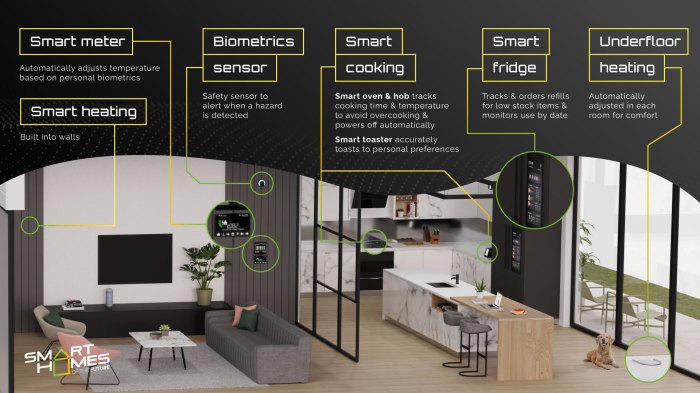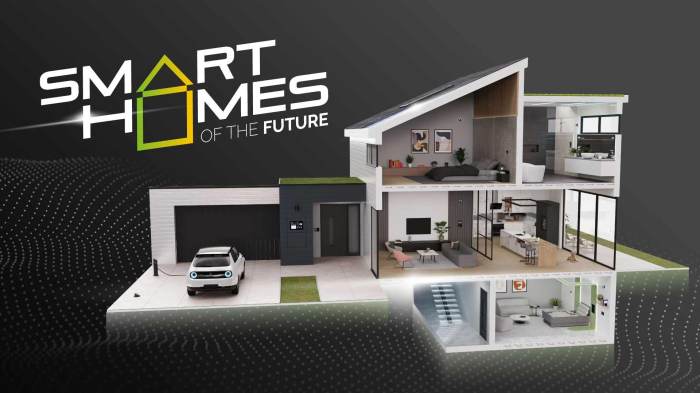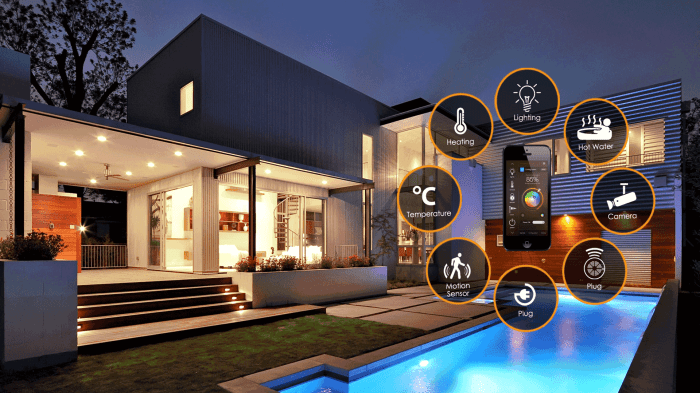The future of smart home systems and emerging technologies is a landscape brimming with innovation, promising to revolutionize how we live, work, and interact with our surroundings. From the early days of basic automation to the sophisticated interconnected devices of today, the journey of smart home technology has been marked by remarkable advancements.
The convergence of artificial intelligence (AI), the Internet of Things (IoT), and blockchain technology is driving a new wave of possibilities, transforming our homes into intelligent ecosystems that adapt to our needs and preferences. This evolution is not merely about convenience; it holds the potential to enhance our safety, optimize energy consumption, and elevate our overall quality of life.
Emerging Technologies Shaping the Future

The rapid advancement of technology is driving a transformative revolution in the way we live, work, and interact with our surroundings. Smart home systems are at the forefront of this revolution, leveraging emerging technologies to create more convenient, efficient, and personalized living experiences.
The future of smart home systems is exciting, with emerging technologies constantly pushing the boundaries of what’s possible. One key area of development is the integration of sleek design, like the systems discussed in Smart Home System with Sleek Design: Enhancing Convenience Efficiency and Aesthetics , which seamlessly blends functionality with aesthetics.
This focus on design ensures that smart home technology isn’t just convenient and efficient, but also enhances the overall look and feel of your living space.
Artificial Intelligence (AI) in Smart Homes
AI is fundamentally changing the landscape of smart home systems, enhancing their capabilities and making them more intuitive and responsive to user needs.
- Voice Control:AI-powered voice assistants like Amazon Alexa and Google Assistant are transforming how we interact with our homes. These assistants can understand natural language commands, allowing users to control lighting, temperature, appliances, and other devices with voice commands.
- Automation:AI algorithms can learn user preferences and routines, automating tasks such as adjusting lighting levels based on time of day, setting thermostats based on occupancy, and controlling appliances based on usage patterns. This automation not only enhances convenience but also optimizes energy efficiency.
The future of smart home systems is exciting, with emerging technologies promising seamless integration and automation. But with this progress comes the challenge of ensuring security. As our homes become increasingly connected, it’s crucial to address the vulnerabilities and implement robust mitigation strategies.
Check out this insightful article on Smart Home System Security Risks and Mitigation Strategies to learn how to protect your home and your data. By understanding and addressing security concerns, we can embrace the full potential of smart home technology while safeguarding our privacy and peace of mind.
- Predictive Maintenance:AI can analyze sensor data from smart appliances and predict potential issues before they occur. This enables proactive maintenance, reducing downtime and preventing unexpected breakdowns. For example, a smart refrigerator could alert the user to a potential compressor failure based on temperature fluctuations, allowing for timely repairs and avoiding costly replacements.
The Internet of Things (IoT) and Seamless Connectivity
The Internet of Things (IoT) is a network of interconnected devices that communicate and exchange data, enabling seamless integration within smart homes.
The future of smart home systems is incredibly exciting, with new technologies constantly emerging. From voice assistants to automated lighting, these systems are becoming more intuitive and accessible. If you’re looking to upgrade your small apartment, check out this guide to the Best Smart Home System for Small Apartments.
These systems can help you save energy, improve security, and create a more comfortable living space, making them a valuable investment for the future of your home.
- Device Interoperability:IoT allows different devices from various manufacturers to communicate and work together, creating a unified ecosystem. This eliminates the need for separate control systems and enables a more holistic approach to home automation.
- Remote Control and Monitoring:IoT enables users to control and monitor their smart home devices from anywhere in the world through mobile apps or web interfaces. This allows for convenient management of home functions, such as adjusting thermostats, locking doors, and checking security cameras, regardless of location.
- Data Collection and Analysis:IoT devices generate vast amounts of data, providing insights into user behavior and home performance. This data can be analyzed to optimize energy consumption, identify security vulnerabilities, and personalize user experiences.
Blockchain Technology and Enhanced Security, The future of smart home systems and emerging technologies
Blockchain technology, known for its decentralized and secure nature, is emerging as a powerful tool for enhancing security, privacy, and data management within smart home ecosystems.
- Data Security:Blockchain’s immutable and tamper-proof ledger provides a secure platform for storing and managing sensitive data, such as user credentials, payment information, and device configurations. This helps protect against unauthorized access and data breaches.
- Privacy Protection:Blockchain enables data ownership and control, empowering users to decide how their data is used and shared. This can enhance privacy by preventing unauthorized access and ensuring data is only shared with trusted parties.
- Transparent Data Management:Blockchain creates a transparent and auditable record of all data transactions, providing accountability and traceability. This helps build trust and ensures data integrity within the smart home ecosystem.
Smart Home System Functionality and Applications: The Future Of Smart Home Systems And Emerging Technologies

Smart home systems are becoming increasingly popular as they offer convenience, efficiency, and enhanced security for homeowners. These systems integrate various devices and appliances within a home, allowing users to control and monitor them remotely through a central hub or smartphone app.
Smart Home System Categories and Applications
Smart home systems can be categorized based on their primary functionalities. Each category encompasses various devices and applications that address specific needs and preferences.
| Category | Devices | Functionality | Benefits |
|---|---|---|---|
| Security | Smart door locks, security cameras, motion sensors, smoke detectors, carbon monoxide detectors | Remotely lock/unlock doors, monitor home activity, receive alerts in case of intrusion or emergencies | Enhanced security, peace of mind, remote monitoring, proactive safety measures |
| Energy Management | Smart thermostats, smart lighting, smart plugs, energy monitoring systems | Automate temperature control, optimize lighting usage, control appliance power consumption, track energy usage | Reduced energy consumption, lower utility bills, improved comfort, environmental sustainability |
| Entertainment | Smart TVs, streaming devices, smart speakers, home theater systems, multi-room audio systems | Control entertainment systems, stream content, play music, adjust sound settings, create personalized entertainment experiences | Enhanced entertainment experience, convenience, seamless integration of devices, personalized settings |
| Health Monitoring | Smart scales, fitness trackers, sleep monitors, blood pressure monitors, smart medication dispensers | Track health metrics, monitor sleep patterns, receive health reminders, manage medication schedules, promote healthy habits | Improved health awareness, proactive health management, personalized health insights, medication adherence |
Customization and Personalization of Smart Home Systems
Smart home systems offer a high degree of customization and personalization, allowing users to tailor them to their specific needs and preferences.
“Smart home systems are designed to be flexible and adaptable, catering to diverse lifestyles and living situations.”
For instance, a family with young children may prioritize safety features, such as childproof locks and motion sensors, while a working professional may prefer automation features, such as scheduling lights and appliances to optimize energy consumption.
End of Discussion

As we stand on the cusp of a future where our homes become extensions of our digital selves, it is crucial to approach the adoption of smart home systems with a discerning eye. Understanding the potential security vulnerabilities, data privacy concerns, and ethical implications is paramount.
By embracing responsible innovation and prioritizing user empowerment, we can unlock the transformative potential of smart home technology, creating a future where our homes are not just spaces we inhabit but intelligent partners in our lives.